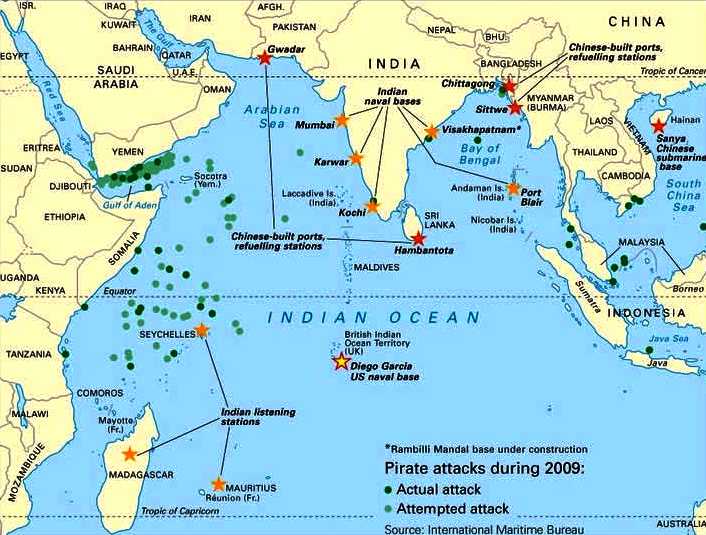---
Pete Comment
If joint
Pakistani and Chinese (PLA-N) navy patrols become regular and frequent in the
Indian Ocean this may be detrimental to India’s and Australia’s security.
SMRUTI DESHPANDEfor India’s The Print reports https://theprint.in/defence/pakistan-and-china-to-conduct-maiden-joint-patrolling-with-submarines-and-destroyers/1844330/ November 14, 2023:
“Pakistan and China to conduct maiden joint patrolling with submarines and destroyers” (Edited by Tony Rai)
Two navies are currently jointly
conducting the third edition of Sea Guardian-3. This comes soon after India, US
held the fifth edition of annual 2+2 ministerial dialogues on 10 November.
New Delhi: Chinese and Pakistani
navies will be conducting their first joint patrol in the high seas, indicating
the flourishing military relationship that both share.
[China’s
Global Times, November 16, also reported https://www.globaltimes.cn/page/202311/1301985.shtmlthe
joint patrol exercise, known as China-Pakistan Sea Guardian-3,was
in waters around major
maritime routes and port channels in the northern Arabian Sea, And “This marks the first time
that the PLA Navy and the Pakistan Navy have held a joint maritime patrol”
“During the joint patrol [and presumably exercise], the two sides conducted training
that included joint search and rescue operations, formation maneuvering and
VBSS (visit, board, search and seizure), effectively enhancing their
capabilities in jointly dealing with maritime security threats.” Song Zhongping, a Chinese military expert and TV commentator, told the
Global Times“a joint patrol is a military presence that allows
fast response to emergencies and safeguards security in a region, while a joint
exercise is training with preset goals and targets.” And Song said “This
type of joint naval patrol will likely become routine.”]
While the US has
been traditionally the big arms supplier to Pakistan for several decades, China
has now emerged as the key player with sales from artillery to fighter aircraft
and submarines.
The joint patrolling in the Arabian Sea was announced by the
People’s Liberation Army Navy (PLAN) as part of the ongoing bilateral naval
exercise.
This comes soon after India and the US held the fifth edition
of the annual 2+2 ministerial dialogues to cooperate on security issues, on 10 November in
New Delhi. The exercise also comes after Russia, Myanmar held naval drills,
beginning 7 November [2023], in the Andaman Sea [of the Indian Ocean].
The opening ceremony of the
Sea Guardian-2023 was held at the Pakistan Navy Dockyard in Karachi...
As per the PLA, six vessels, including the [Type 052D destroyer] Zibo, [Type 054A] frigates Jingzhou and Linyi, and the [Type 903 replenishment ship Qiandaohu] along with two shipborne helicopters and dozens of marines. China’s PLA Navy has also deployed a Type-039 Song-class diesel-electric submarine for the exercise.
[The Global Times also reported the Pakistani frigate Type 054A/P frigate Shah Jahan and F-22P
frigate Saif also participated].
China’s defence cooperation with Pakistan
Military cooperation between the two countries is elaborate, and
Pakistan remains heavily dependent on China for its defence needs.
In
a special report published
in March 2023, United States Institute of Peace stated: “Pakistan received
significant injections of US arms during the Afghan jihad in the 1980s and
during the war on terror (particularly from 2005 to 2015), but the volume of US
arms never caught up with that of Chinese arms transfers, which began a steep
ascent around 2009.
“The dramatic growth in
arms transfers is clear while looking at trend-indicator value (TIV), a measure
of the volume of international arms transfers that represents relative military
resources rather than the financial value.
[The Stockholm International Peace Research Institute (SIPRI) TIV is described on the Arms Transfers Database https://www.sipri.org/databases/armstransfers].
The estimated value of Chinese arms transferred to Pakistan in the past 15 years (US$8,469 million TIV) is nearly equal to the estimated value of arms transferred to Pakistan by China in the previous 50 years (US$8,794 million TIV). Since 2015, China has provided nearly 75 percent of all of Pakistan’s imported arms (by TIV).”
Chinese platforms such as the JF-17 multirole
combat aircraft form the largest share of Pakistan’s modern fighter fleet.
Pakistan has also inducted limited numbers of the J-10 fighters.
In 2021, Pakistan acquired the Chinese-made Air Defence (AD) system HQ-9/P, [a derivative of the Russian S-300] also called the High-to-Medium Air Defence System Surface to Air Missile (HMADSAM) system.
Similarly, the Pakistan
Army uses a number of Chinese-origin equipment such as artillery and rocket
launchers.
For its Navy, Pakistan is
said to have inducted Chinese Type 054A/P frigates, and potentially even a
destroyer, alongside its already deployed F-22 frigate for sea control.
Pakistan has also ordered [8 x Type 039B variant AIP Hangor-class diesel-electric] submarines that are
being built simultaneously in the two countries.
